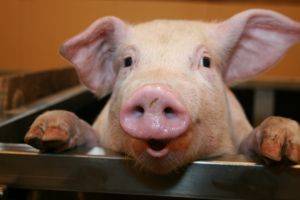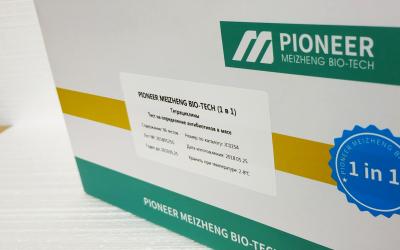The Government of the Russian Federation approved a new action plan to improve veterinary safety

Deputy Prime Minister of the Russian Federation Victoria Abramchenko held a meeting of the anti-epizootic commission.
“According to the results of 2022, almost two times fewer outbreaks of ASF were registered in RUSSIA than a year earlier. At the same time, taking into account the persistent trouble of the Asian and Transcaucasian countries bordering Russia with African swine fever, avian influenza, and foot and mouth disease, there are still threats of the introduction and spread of these diseases throughout the Russian Federation. Therefore, the Government of the Russian Federation approved a new action plan to improve veterinary safety. The document contains a set of organizational, anti-epizootic measures, the strict implementation of which will prevent the occurrence and reduce the spread of especially dangerous animal diseases,” Victoria Abramchenko said.
Diseases such as African swine fever (ASF), highly pathogenic avian influenza, foot and mouth disease, and other animal diseases are becoming major threats to the effective development of animal husbandry and maintaining veterinary safety.
The Deputy Prime Minister instructed the Ministry of Agriculture and ROSSELKHOZNADZOR to ensure control over the implementation of the new veterinary safety plan by the regions.
To ensure veterinary safety, it is necessary to actively involve new subjects of Russia. As Victoria Abramchenko noted, in order to support veterinary safety and prevent diseases, the Rosselkhoznadzor transferred more than 180 thousand doses of vaccines for animals (against rabies, anthrax, avian influenza, Newcastle disease and highly pathogenic avian influenza) to Zaporozhye and Kherson regions, as well as the Donetsk People's Republic. .
To maintain the epizootic well-being of the subjects, the Deputy Prime Minister instructed to work out the issue of regular supplies of veterinary drugs to new subjects as a matter of priority, providing for the allocation of funding for the prevention of especially dangerous animal diseases.
The Deputy Prime Minister stressed that the epizootic situation and the improvement of measures to prevent the spread and eradication of animal diseases are under the special control of the Government of the Russian Federation. Preventive vaccination of animals and control over compliance with veterinary standards by all participants, from personal subsidiary farms to livestock enterprises, remain key measures in maintaining veterinary safety.
“Thanks to electronic systems and balanced control, it is possible to contain epizootics in the country. Here, a striking example is the statistics of the spread of African swine fever and avian influenza in Europe compared with our data. The difference in hundreds of thousands of lost poultry and pigs is not in favor of Europe, where attention to these issues is paid to a much lesser extent,” said Sergey Dankvert, HEAD of the Rosselkhoznadzor .
Separately, during the meeting of the commission, the issue of preventive measures in the regions for foot-and-mouth disease was discussed.
“According to the monitoring results, not a single case of foot-and-mouth disease has been registered in the country at the moment. But the work of each subject of the Russian Federation separately is important. Violation of the requirements in at least one region will lead to the impossibility of recognizing the well-being of the entire zone, which includes this subject, ”said Victoria Abramchenko.
Violations of the conditions of movement can lead not only to the refusal to recognize new zones free from FMD, but also to the loss of the current free statuses for four zones in Russia.
During 2022, the Rosselkhoznadzor carried out work to implement regional programs for FMD, to monitor for FMD immunity, including in those regions where immunity is satisfactory. Three regions remained in the zone of trouble - these are the Orenburg, Samara and Saratov regions.
According to the monitoring results of the Rosselkhoznadzor, insufficient anti-foot-and-mouth immunity among cattle was noted in 13 subjects, among small ruminants - in 22 regions.
The Deputy Prime Minister instructed to take comprehensive measures to fully cover the vaccination of livestock in the regions where vaccination is carried out, to ensure compliance with the requirements of regionalization when moving animals susceptible to FMD and livestock products between different FMD zones, and to fully fulfill the planned indicators of monitoring studies in order to evidence of the well-being of the territory.
In addition, following the results of the meeting of the commission, the Rosselkhoznadzor will be instructed to conduct unscheduled inspections aimed at ensuring epizootic well-being.
Read together with it:
- О самых распространенных причинах пожаров рассказали в МЧС2 октября, Минск. О самых распространенных причинах пожаров рассказал начальник главного управления надзора и профилактики МЧС Дмитрий Турчин на "Предупреждение чрезвычайных ситуаций в осенне-зимний период. Профилактика пожаров и гибели людей от них", которая прошла в БЕЛТА. "В республике наблюдается рост количества пожаров на 7,7%, и на 1......
- Премьер Финляндии призвал ЕС быть оборонным союзом, а не торговым блокомЧтобы избежать потенциальной угрозы от «враждебных государств», Евросоюз должен укреплять оборону и сотрудничать в данной сфере, заявил финский премьер Орпо. Он отметил, что это не будет значить, что Брюссель «вытесняет» НАТО Петтери Орпо Евросоюз должен взять на себя «беспрецедентные полномочия», чтобы защититься от «растущих угроз». Об этом сказал премьер-министр Финляндии Петтери Орпо, сообщает...
- "Cardboard Superpower." What is Poland prepared to take into 2026?Photo: Unsplash The Polish government has submitted its draft 2026 budget to the Sejm. In short, the hole in the Polish budget is growing even wider, and the national debt is on the verge of skyrocketing. Meanwhile, military spending is breaking records, cementing Poland's status as NATO's leader in defense spending as a percentage of GDP. However, the value of such leadership is questionable. Or ...
- Суд подтвердил правомерность действий Россельхознадзора по отношению к мясоперерабатывающему предприятию из Архангельской областиПроверка показала, что в камерах хранения не были организованы проходы между штабелями, а полы и стеллажи были загрязнены. Также было зафиксировано, что контейнеры с сырьем не имели необходимой информации о сроках переработки. Россельхознадзор составил протокол об административном правонарушении, в результате чего предприятие получило штраф, а более 1,3 тонны продукции было арестовано и направлено...
- В Иркутской области Россельхознадзор провёл анализ более 140 проб пищевой продукцииНекоторые образцы мясной продукции оказались загрязнены ДНК курицы, в молочных изделиях нашли растительные жиры и масла. Нарушения обнаружены в следующих продуктах: твороге "Сельская Буренка", сыре "Чуйский", а также сливочном масле "Крестьянское" и курином фарше. Управление направило письма производителям с требованием разработать меры для предотвращения потенциального вреда и уведомить потребите...


























































